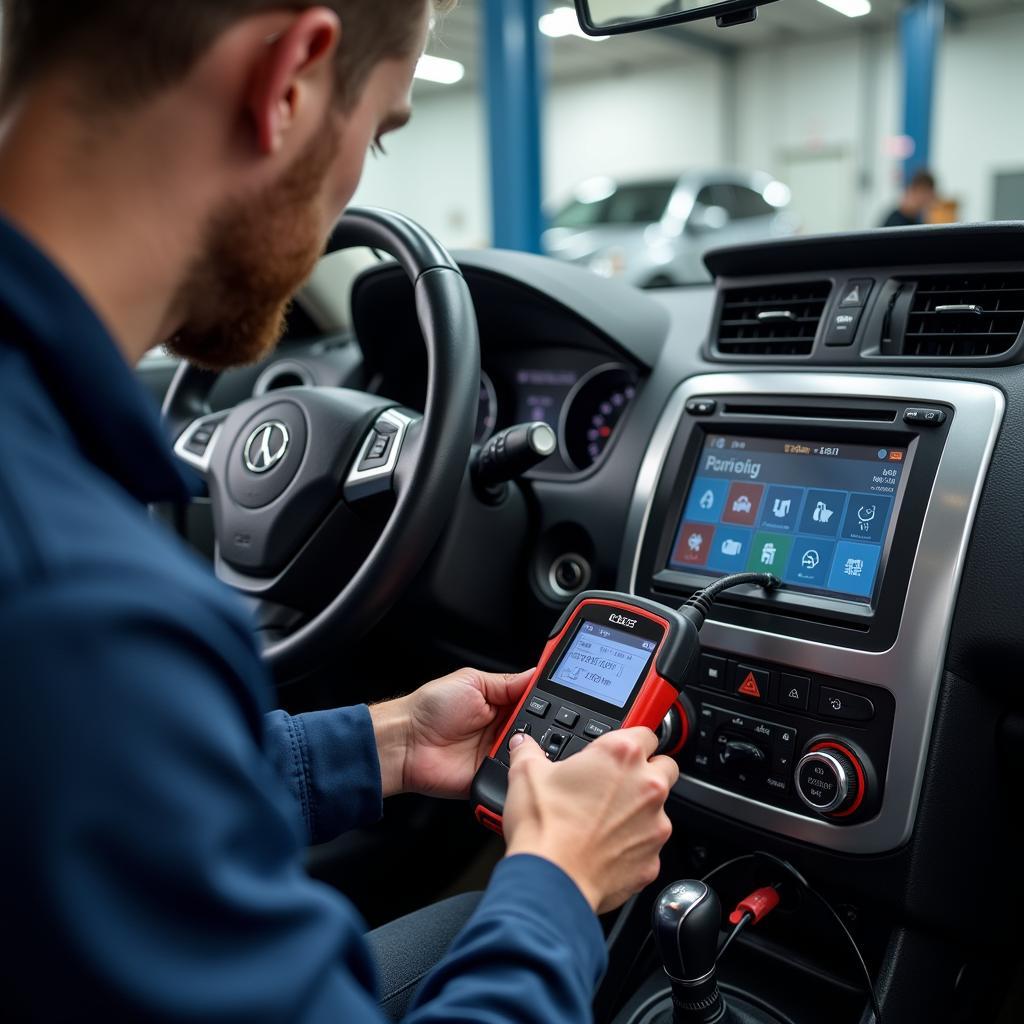In today’s tech-driven world, a “Diagnostic Car” check is no longer a luxury but a necessity. Whether you’re experiencing car trouble or planning to buy a used vehicle, understanding car diagnostics can save you time, money, and potential headaches. This comprehensive guide delves deep into the world of car diagnostics, equipping you with the knowledge to navigate the complexities of modern vehicles.
 Modern Car Diagnostic Tools
Modern Car Diagnostic Tools
What is Diagnostic Car?
Diagnostic car, often referred to as car diagnostics or onboard diagnostics, involves using electronic tools to retrieve data from your vehicle’s computer system. This data provides valuable insights into the health of your car, revealing hidden issues and potential problems before they escalate into costly repairs.
Think of your car’s computer system like its brain, constantly monitoring various systems like the engine, transmission, brakes, and emissions. When a problem arises, the computer stores a trouble code, which can be accessed and interpreted during a diagnostic car scan.
Why is Diagnostic Car Important?
The importance of diagnostic car checks cannot be overstated:
- Early Detection: Car diagnostics can detect problems in their early stages, even before you notice any symptoms. This proactive approach can prevent minor issues from escalating into major, expensive repairs.
- Accurate Diagnosis: Gone are the days of relying solely on a mechanic’s intuition. Diagnostic car tools provide precise data, leading to accurate diagnoses and targeted repairs.
- Cost Savings: By identifying problems early on, you can avoid unnecessary repairs and prevent further damage to your vehicle, ultimately saving you money in the long run.
- Improved Safety: A diagnostic car check can reveal potential safety hazards related to brakes, airbags, and other critical systems, ensuring a safer driving experience.
- Increased Resale Value: Regular diagnostic checks and timely repairs can contribute to a well-maintained vehicle history, potentially increasing its resale value.
How Does Diagnostic Car Work?
At the heart of diagnostic car technology lies the OBD-II port, a standardized connector found in most vehicles manufactured after 1996. Mechanics and car owners use a diagnostic car reader to connect to the OBD-II port, retrieving and interpreting the stored trouble codes.
These codes, often presented as a combination of letters and numbers, correspond to specific issues within your car’s systems. For instance, a code like “P0301” might indicate a misfire in cylinder 1.
Types of Diagnostic Car Tests
There are various types of diagnostic car tests available, each offering a different level of depth and detail:
- Basic Scan: This scan retrieves and displays the stored trouble codes, providing a general overview of potential issues.
- Enhanced Scan: Also known as a comprehensive scan, this test delves deeper, accessing more data points and providing detailed information about the identified issues.
- System-Specific Scan: This scan focuses on a particular system, such as the engine, transmission, or ABS, providing in-depth analysis and troubleshooting information.
DIY vs. Professional Diagnostic Car Checks
While DIY diagnostic car readers are readily available, seeking professional assistance is often recommended for the following reasons:
- Expertise: Professional mechanics possess the knowledge and experience to accurately interpret complex trouble codes and diagnose intricate car problems.
- Advanced Equipment: Professional garages often utilize advanced diagnostic tools that offer more comprehensive scans and data analysis compared to basic DIY readers.
- Repair Capabilities: Beyond diagnosis, professional mechanics have the skills and equipment to perform necessary repairs, ensuring your car receives the appropriate care.
When Should You Get a Diagnostic Car Check?
Consider getting a full diagnostic car test near me under these circumstances:
- Warning Lights: If your check engine light, ABS light, or any other warning light illuminates on your dashboard.
- Performance Issues: If you experience rough idling, engine misfires, reduced fuel efficiency, or any unusual noises or vibrations.
- Before Buying a Used Car: A pre-purchase inspection, including a diagnostic car scan, can reveal hidden problems and help you make an informed buying decision.
- Regular Maintenance: Incorporating a diagnostic car scan as part of your routine maintenance schedule can help prevent potential issues and ensure optimal vehicle performance.
Finding a Reliable Diagnostic Car Centre
Choosing the right diagnostic car centre is crucial. Look for a reputable diagnostic car centre in Witney or your local area with experienced technicians, advanced equipment, and positive customer reviews. Don’t hesitate to inquire about their diagnostic procedures and fees beforehand.
Diagnostic Car: The Future of Car Maintenance
As cars become increasingly sophisticated, diagnostic car technology will continue to evolve, offering even more precise diagnoses and predictive maintenance capabilities.
“The future of car maintenance is all about proactive prevention,” says automotive expert Sarah Jones. “Diagnostic car technology empowers car owners to stay ahead of potential problems, ensuring a smoother, safer, and more cost-effective driving experience.”
By embracing diagnostic car technology, you can unlock a wealth of information about your vehicle’s health, enabling you to make informed decisions about its maintenance and upkeep.

Leave a Reply